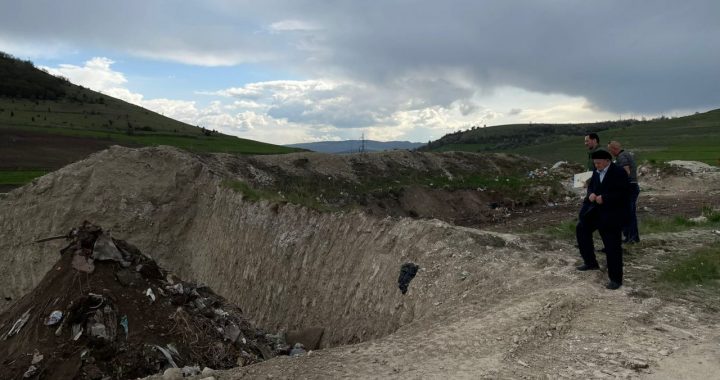

 Experts and family representatives observe excavations near the Stavalj mine on Tuesday. Photo: Kosovo Government Commission on Missing Persons.
Experts and family representatives observe excavations near the Stavalj mine on Tuesday. Photo: Kosovo Government Commission on Missing Persons.
Preliminary excavations have begun at a mine near the town of Sjenica in southern Serbia, where experts are searching for the bodies of people who went missing during the 1998-99 Kosovo war.
The Kosovo authorities announced on Tuesday evening that preliminary excavations have started at the Stavalj mine in the Sjenica municipality, where it is suspected that there could be a mass grave of victims of the 1998-99 Kosovo war.
“Excavations have started after satellite images were obtained through the ICRC [International Committee of the Red Cross] at the end of last week. They will be analysed in coming days in order to have the exact location of the mass grave,” the Kosovo government’s Commission on Missing Persons said in a statement.
Representatives of war victims’ families, the Kosovo government’s Commission on Missing Persons and the ICRC attended the first day of preliminary excavations.
“Kosovo forensic experts will continue to remain at the location to observe the works during the upcoming period,” the commission’s statement added.
The Serbian government’s office for missing persons said that a “search of the terrain” had begun at the Stavalj mine, based on an order issued by Serbian War Crimes Prosecutor’s Office search of terrain started in Stavalj mine, near Sjenica.
“The search of the terrain will go on until the facts that are necessary to specify the exact location of a possible mass grave are determined and clarified,” it said in a statement on Tuesday evening.
The Kosovo government’s Commission on Missing Persons said it has repeatedly asked Serbia to disclose any information it has about the Stavalj mine location.
“Families [of missing persons] continue to live in pain and anxiety to know the whereabouts of their loved ones who have been missing since the war,” it added.
Several mass graves have been exhumed in southern Serbia since the Kosovo war. The bodies of Kosovo Albanians killed by Serbian forces in wartime massacres were brought there to be buried as part of attempts by Yugoslav President Slobodan Milosevic’s regime to cover up the crimes.
After the most recent mass grave discovery, at an open-cast mine in Kizevak in southern Serbia, the remains of seven Kosovo Albanian war victims were handed over to Kosovo authorities in Septeber last year after they were exhumed.
Around 6,000 missing persons from the Kosovo war have already been found and identified, but there are still more than 1,600, mainly ethnic Albanians but also some Serbs and Roma, whose whereabouts remain unknown.
During the ongoing EU-facilitated talks between Belgrade and Pristina aimed at normalising relations, one of Pristina’s negotiating team said in 2020 there had been a draft agreement to set up a joint committee with Serbia aimed at finding the remaining people who disappeared as a result of the war, but no more details have yet become public.
Serbia and Kosovo have also asked each other to open up wartime military archives in an attempt to shed light on concealed burial sites, but no concrete steps have yet been taken.
11 May 2022 - 12:50

Journalistic documentation of Kosovo’s civil resistance in the 1980s...

A Pristina court for a second time found Muhamet Alidemaj, a former Se...

More than two years since the deal was made, EU Special Representative...

As part of its second Reporting House museum, BIRN is chronicling the ...